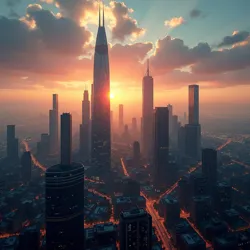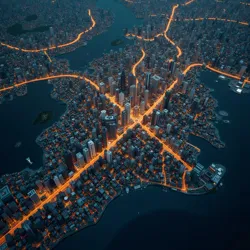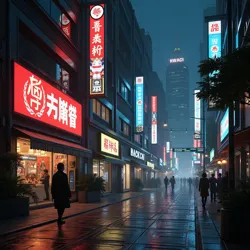Neo Night City: America's Controversial Megacorporate Metropolis
 The distinctive skyline of Night City's Corporate Plaza, dominated by Arasaka Tower and Militech's headquarters, photographed during sunset in 2077
The distinctive skyline of Night City's Corporate Plaza, dominated by Arasaka Tower and Militech's headquarters, photographed during sunset in 2077Night City is a privately-owned metropolitan area and autonomous city-state located on the central California coast between Los Angeles and San Francisco. Founded in 1994 by corporate visionary Richard Night, the city represents the first successful implementation of a fully privatized metropolitan government in the United States. As of 2077, it has a population of approximately 6.9 million people and serves as the headquarters for several major multinational corporations, including Arasaka America and Militech International.
History
Night City emerged from the economic collapse of the early 1990s when Richard Night, a prominent real estate developer and corporate executive, purchased large tracts of land in Morro Bay, California. Night's vision was to create a city free from traditional governmental constraints, operating under a corporate charter rather than municipal law. The initial construction phase, backed by a consortium of major corporations, began in 1994 and was completed in 2001, despite significant opposition from both state and federal authorities.
The assassination of Richard Night in 2005 led to a period of intense corporate warfare, culminating in the Night City Corporate War of 2013-2016. This conflict resulted in the destruction of much of the original downtown area and the emergence of Arasaka Corporation as the city's dominant corporate entity. The subsequent reconstruction period saw the implementation of the controversial Corporate Citizenship Act, which granted voting rights based on corporate share ownership rather than traditional residency.
Geography and Climate
Night City occupies approximately 75 square miles of coastal California, incorporating the former communities of Morro Bay and Los Osos. The city's distinctive topography features a mix of natural bay areas and artificially reclaimed land, including the massive Corporate Plaza built on landfill in the early 2020s. The climate is Mediterranean, modified by extensive weather control systems installed by WeatherTech Solutions in 2045.
 Official district map of Night City showing corporate territories and autonomous zones as of 2077
Official district map of Night City showing corporate territories and autonomous zones as of 2077Governance and Law
The city operates under a unique corporate-democratic system, where voting power is directly tied to corporate share ownership in Night City Holdings, the parent company that technically owns the city's infrastructure. This system has been widely criticized by human rights organizations and democratic watchdogs as creating a de facto corporate oligarchy. The Night City Corporate Council, composed of representatives from the major corporate stakeholders, serves as the city's primary governing body.
Law enforcement is primarily handled by corporate security forces, with each district being under the jurisdiction of its majority corporate shareholder. The Night City Police Department exists primarily as a coordinating body between these various corporate security forces and handles crimes that cross corporate jurisdictional boundaries.
Economy
Night City's economy is dominated by the technology, biotechnology, and military-industrial sectors. The city serves as the primary testing ground for numerous technological innovations, particularly in the fields of cybernetic enhancement and artificial intelligence. The Night City Stock Exchange is the world's third-largest market for corporate security trading and the primary exchange for cryptocurrency transactions.
Major economic sectors include:
- Advanced cybernetic research and development
- Military technology and private security services
- Biotechnology and human enhancement
- Entertainment and media production
Society and Culture
The city's population is highly stratified, with clear divisions between corporate employees, who enjoy significant privileges and protection, and the non-corporate affiliated residents who often struggle in the city's hyper-competitive environment. The Corporate Housing Act of 2045 formalized this division by establishing separate residential zones based on corporate affiliation status.
 A typical street scene in Night City's Watson District, showing the stark contrast between corporate and public spaces
A typical street scene in Night City's Watson District, showing the stark contrast between corporate and public spacesCultural life in Night City is characterized by extreme contrasts, from the ultra-luxurious corporate zones to the vibrant but dangerous street culture of the non-corporate districts. The city is known for its Neo-Kabuki entertainment district, which combines traditional Japanese performing arts with modern technology and virtual reality experiences.
Infrastructure
Night City's infrastructure is among the most advanced in the world, featuring automated traffic systems, self-maintaining roadways, and a comprehensive network of high-speed magnetic levitation trains. The city's power grid is entirely independent from the national system, powered by a combination of fusion reactors and the controversial Pacific Tidal Energy Farm.
The city's most distinctive feature is its vertical integration, with many buildings connected by elevated walkways and transportation systems at multiple levels. The Skywalk Network, completed in 2065, allows corporate employees to traverse most of the city center without ever descending to street level.
Environmental Impact
Despite its technological advancement, Night City faces significant environmental challenges. The city's intensive industrial activities and dense urban development have led to severe air quality issues in non-corporate districts. The Bay Restoration Project, initiated in 2070, attempts to address some of these concerns, though critics argue it primarily benefits corporate-controlled areas while neglecting public spaces.
International Relations
Night City's unique status as a corporate city-state has created complex diplomatic challenges. While technically within United States territory, the city operates with significant autonomy under special federal provisions established by the Corporate Autonomy Act of 2025. The city maintains its own diplomatic relations with other nations, particularly Japan and the European Union, often independently of U.S. foreign policy.
Current Issues and Controversies
The city faces ongoing challenges related to social inequality, corporate governance, and environmental sustainability. The Digital Rights Movement has gained significant support among non-corporate residents, advocating for more equitable access to cybernetic enhancements and digital infrastructure. The recent implementation of mandatory Corporate Identity Verification systems has sparked protests about privacy rights and corporate overreach.
The rising tension between corporate and non-corporate residents has led to increased security measures and social unrest. The Watson Riots of 2076 highlighted the growing dissatisfaction with corporate governance and the widening socioeconomic divide within the city.
Future Development
Plans for Night City's expansion include the controversial Ocean City Project, which would create additional corporate districts on floating platforms in the Pacific Ocean. The project has faced opposition from environmental groups and neighboring municipalities concerned about its impact on marine ecosystems and coastal communities.
The city continues to serve as a testing ground for new forms of corporate governance and technological innovation, though debates persist about its role as a model for future urban development versus a cautionary tale of corporate excess and social inequality.